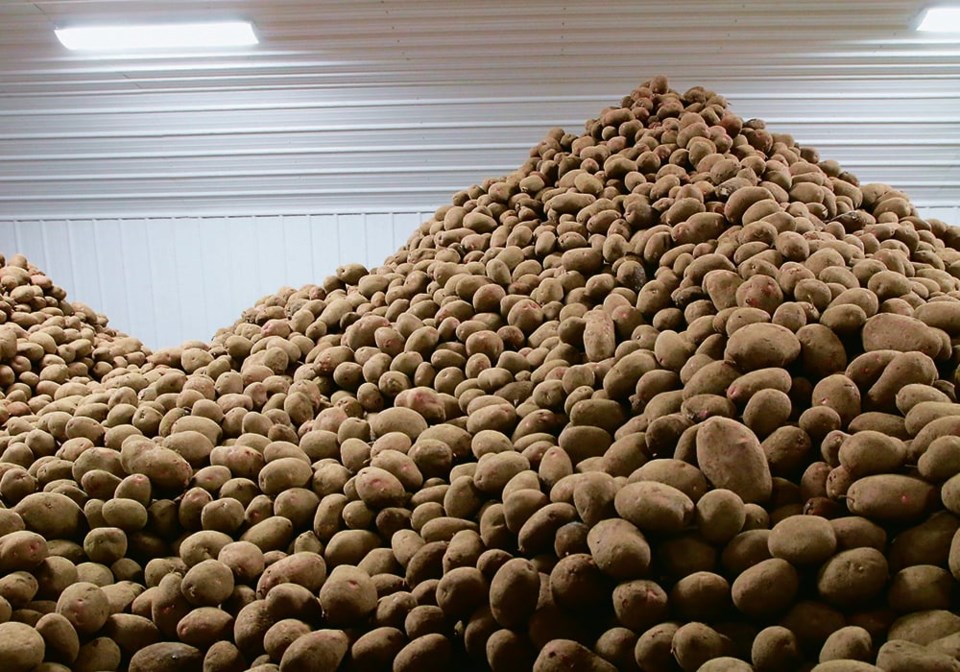WESTERN PRODUCER — There will be no shortage of french fries in 2024.
Canada and the United States produced a massive crop of potatoes in 2023, so french fry processing plants in Alberta, Manitoba and elsewhere will need to operate at full capacity to work through the huge stockpile of spuds.
Statistics Canada data, released in early December, shows that farmers produced a record crop of 128 million hundred weight (cwt) of potatoes in 2023.
That’s 22 percent more potatoes than Canada’s 2020 crop and 3.7 percent higher than 2022.
“There was more acreage in the West… and you also had much better yields,” said Victoria Stamper, general manager of the United Potato Growers of Canada, who was boarding a train in Montreal, while speaking to The Western Producer.
Growing conditions were dry in southern Alberta but the lion’s share of potatoes are grown under irrigation. In Manitoba the crop got off to a strong start, thanks to warm weather in the spring.
Yields in both provinces were above normal – with Alberta hitting a yield of 419 cwt per acre and Manitoba at 372 cwt per acre, using Stats Can data.
American farmers in Idaho and Washington State also produced strong yields.
“More than enough (potatoes). I’ve got extra,” said Terence Hochstein, Potato Growers of Alberta executive director, in October.
“Basically, North America-wide, everything west of the Mississippi had a hell of a good crop.”
As a result, there’s an over-supply of spuds in the western half of North America.
Producers in some regions have struggled to find buyers for the huge volume of potatoes.
“Northwest potato farmers are staring at the prospect of destroying an overwhelming surplus of premium french-fry-making potatoes,” said yoursource.one, a media outlet in the Columbia Basin of Washington State and Idaho, last month.
“An estimated 165,000 tons, equivalent to 5,000 loaded semi-trucks, are slated to either be dumped into cattle troughs or be outright destroyed.”
Disposing of potatoes to markets other than french fry processing plants, has also happened in Manitoba and Alberta.
“In my 30 years in the industry, I’ve never seen anything like this,” said Dale Lathim, president of the Potato Marketing Association of North America.
For several years, french fry processing plants in western North America didn’t have sufficient potatoes because of weak production in Idaho and elsewhere.
They contracted more acres in 2023 to avoid another shortage, which likely caused the over-supply.
The good news is that processers like McCain Foods, Simplot and Lamb Weston are building new plants or expanding existing operations in Alberta, Idaho, Oregon and Washington State.
“There are large surpluses of potatoes in North America, especially Russets, in the Pacific Northwest,” says a crop update from the United Potato Growers of Canada
“However, the earliest (new capacity) will be only in the spring 2024 in Idaho, not soon enough to take much of this surplus.”
On the other side of North America, in Prince Edward Island and New Brunswick, potato supplies are relatively tight.
Yields declined in Atlantic Canada compared to 2022, as growers struggled with wet conditions and a soggy harvest.
The average yield in PEI was 311 cwt per acre, down seven percent from 2022.
New Brunswick was worse. Average yields were 295 cwt, a drop of 10 percent from 2022.
“There is a tightening of supply there,” Stamper said.
It’s possible that potatoes could be shipped in from Western Canada, to make up for the shortfall in the Maritimes.
“Moving (potatoes) from Manitoba isn’t bad (expensive) as Alberta,” Stamper said. “Moving from Manitoba could be a potential (solution), depending on the requirements.”
Contact [email protected]
SASKTODAY.ca is Saskatchewan's home page. Bookmark us at this link.




